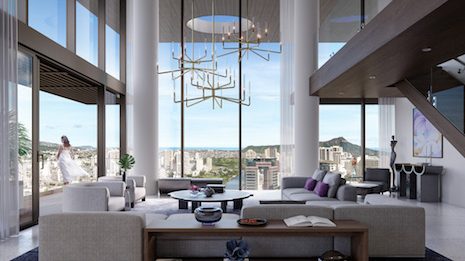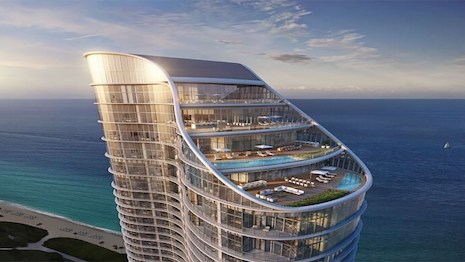 A rendering of The Residences at Mandarin Oriental, Honolulu. Image credit: Mandarin Oriental
A rendering of The Residences at Mandarin Oriental, Honolulu. Image credit: Mandarin Oriental
With more than 400 branded residences across more than 60 countries, hotel groups need to rely on experiences, technology and sustainable practices to differentiate themselves.
According to Knight Frank's 2019 Branded Residences report, Asia is now home to 30 percent of branded properties with residences being almost evenly split between urban centers and resort areas. In North America, where the concept originated, two-thirds of branded residences are located in cities.
"European capitals have been playing value catch up and we have seen significant price growth in Berlin, Paris, Amsterdam and Barcelona which may prompt an expansion of the sector as developers look to get ahead of the competition," said Alexander Lewis, residential development consultancy partner at Knight Frank, London.
Residents' expectations
Luxury residences help high-end homebuyers avoid the inconveniences associated with property ownership, especially since many are juggling several other properties. In particular, hotel-operated properties are becoming more popular as affluents seek the high levels of comfort, amenities and service on a more daily basis.
Buyers already familiar with hospitality groups are drawn to their branded residences as opposed to other luxury properties, according to a marketing executive from The Residences at Mandarin Oriental (see story).
Beyond luxe amenities such as terraces or gourmet-style kitchens, homebuyers are also looking for exceptional experiences that can be facilitated by residences' concierge.
 The first Roberto Cavalli hotel will be located in Dubai. Image courtesy of DAMAC Properties
Developers are also partnering with luxury brands outside of the hospitality industry.
Italian fashion label Roberto Cavalli is building up its branded lifestyle by inking an international hospitality partnership with Dubai-based DAMAC Properties.
Through this new relationship, the developer will launch AYKON Hotels with interior design by Roberto Cavalli throughout Dubai. Construction is set to begin in early 2019 on the first property, a tower that will be located in the Al Sofouh, Dubai Marina development (see story).
Per Knight Frank, Dubai has the highest concentration of branded residences.
The first Roberto Cavalli hotel will be located in Dubai. Image courtesy of DAMAC Properties
Developers are also partnering with luxury brands outside of the hospitality industry.
Italian fashion label Roberto Cavalli is building up its branded lifestyle by inking an international hospitality partnership with Dubai-based DAMAC Properties.
Through this new relationship, the developer will launch AYKON Hotels with interior design by Roberto Cavalli throughout Dubai. Construction is set to begin in early 2019 on the first property, a tower that will be located in the Al Sofouh, Dubai Marina development (see story).
Per Knight Frank, Dubai has the highest concentration of branded residences.
 Rendering of the Ritz-Carlton Residences, Sunny Isles Beach. Image credit: Marriott International
A growing number of luxury hospitality brands are incorporating artificial intelligence into their guest services, and residents expect high-end technology integration at branded properties as well.
Guests at select properties in Marriott Hotels, Westin Hotels & Resorts, St. Regis Hotels & Resorts, Aloft Hotels and Autograph Collection Hotels can now use Alexa's voice technology to access services and amenities (see story).
Sustainable construction is also a priority for residents, just as luxury hotel brands are introducing more eco-friendly initiatives to appeal to more environmentally-conscious travelers. Renewable energy sources, including solar power and hydropower, and on-site water filtration systems are becoming more commonplace at both luxury resorts and residences.
"Hotels will look to carry across an identical service as one would find in a hotel," Mr. Lewis said. "However, trophy schemes will often recruit from the hotel sector to replicate this experience.
"[Branded residences] differentiate amongst themselves through service level and any potential unique selling points that their hotel may carry over the competition," he said. "This could include a trophy spa, Michelin starred restaurant, interior design, rooftop bar etc."
Rapid growth
Although the first branded residence was opened in the 1920s, the concept has seen rapid expansion in the last 20 years as the global ultra-wealthy population continues to grow. According to Knight Frank, over the last century there has been a correlation between wealth creation and demand for branded residences.
Hotel group Marriott International continues to invest in its branded residential portfolio, which includes Ritz-Carlton and St. Regis projects, as more high-end homebuyers seek to establish luxury lifestyles in mixed-use residences.
The hospitality brand has already opened almost 90 residential properties and has 60 additional projects already approved and expected to open in the next four years, a jump of 70 percent.
Marriott residences are dominated by high-end brands, which are expected to comprise 70 percent of all the group's residential properties by 2022. Ritz-Carlton has 35 projects open and has another 15 in development, while the St. Regis is expected to double its residences to 24.
The group's first branded residence opened under the Ritz-Carlton name in 2000, and Marriott expects to operate residential properties in 40 countries and territories by 2022 (see story).
Earlier this year, Four Seasons also announced its global expansion plan, in which it will enter new markets as well as build up its residential business.
Four Seasons Private Residences has a presence in more than 17 countries with 39 properties. The brand claims this number will double by 2023 (see story).
The chain has recently started construction on a residential project in Los Angeles, making it only the second standalone luxury residence for Four Seasons and the first in North America.
Although Four Seasons has been including residential spaces in its properties for decades — it opened its first branded private residences in 1985 — the hospitality group has been slower than others when investing in resident-only properties (see story).
Rendering of the Ritz-Carlton Residences, Sunny Isles Beach. Image credit: Marriott International
A growing number of luxury hospitality brands are incorporating artificial intelligence into their guest services, and residents expect high-end technology integration at branded properties as well.
Guests at select properties in Marriott Hotels, Westin Hotels & Resorts, St. Regis Hotels & Resorts, Aloft Hotels and Autograph Collection Hotels can now use Alexa's voice technology to access services and amenities (see story).
Sustainable construction is also a priority for residents, just as luxury hotel brands are introducing more eco-friendly initiatives to appeal to more environmentally-conscious travelers. Renewable energy sources, including solar power and hydropower, and on-site water filtration systems are becoming more commonplace at both luxury resorts and residences.
"Hotels will look to carry across an identical service as one would find in a hotel," Mr. Lewis said. "However, trophy schemes will often recruit from the hotel sector to replicate this experience.
"[Branded residences] differentiate amongst themselves through service level and any potential unique selling points that their hotel may carry over the competition," he said. "This could include a trophy spa, Michelin starred restaurant, interior design, rooftop bar etc."
Rapid growth
Although the first branded residence was opened in the 1920s, the concept has seen rapid expansion in the last 20 years as the global ultra-wealthy population continues to grow. According to Knight Frank, over the last century there has been a correlation between wealth creation and demand for branded residences.
Hotel group Marriott International continues to invest in its branded residential portfolio, which includes Ritz-Carlton and St. Regis projects, as more high-end homebuyers seek to establish luxury lifestyles in mixed-use residences.
The hospitality brand has already opened almost 90 residential properties and has 60 additional projects already approved and expected to open in the next four years, a jump of 70 percent.
Marriott residences are dominated by high-end brands, which are expected to comprise 70 percent of all the group's residential properties by 2022. Ritz-Carlton has 35 projects open and has another 15 in development, while the St. Regis is expected to double its residences to 24.
The group's first branded residence opened under the Ritz-Carlton name in 2000, and Marriott expects to operate residential properties in 40 countries and territories by 2022 (see story).
Earlier this year, Four Seasons also announced its global expansion plan, in which it will enter new markets as well as build up its residential business.
Four Seasons Private Residences has a presence in more than 17 countries with 39 properties. The brand claims this number will double by 2023 (see story).
The chain has recently started construction on a residential project in Los Angeles, making it only the second standalone luxury residence for Four Seasons and the first in North America.
Although Four Seasons has been including residential spaces in its properties for decades — it opened its first branded private residences in 1985 — the hospitality group has been slower than others when investing in resident-only properties (see story).
